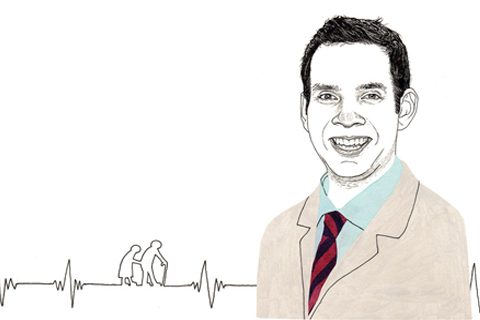Would you rather live longer or in good health? Samir Sinha, a professor of medicine at U of T, hopes most Canadians will achieve both. The reality, though, is that many older people develop a complex mix of health problems. It is these patients Sinha sees frequently as the director of geriatrics for Mount Sinai Hospital and the University Health Network.
While a younger patient may get 15 minutes with their family doctor on a followup visit, Sinha spends three times as long with his older clients. First-timers get two hours. This level of commitment helps to ensure high-quality care and is meant to keep elderly patients healthy and independent for longer. “In order to really support these patients, you need to address each and every one of their health and social issues,” he says.
But as the older population doubles over the coming two decades, the costs of caring for them will balloon. Sinha, 36, notes that the five per cent of Ontarians with the most complex health issues – often elderly patients – account for a whopping two-thirds of all health-care costs in the province. So hospitals have begun looking for ways to meet the needs of this group more efficiently; under Sinha’s direction, Mount Sinai and the University Health Network have recently developed teams of health professionals who are helping to keep older patients out of emergency wards and intensive care units.
One such team – consisting of family doctors, geriatric specialists, therapists, a nurse practitioner and others – is currently caring for 400 frail and homebound patients annually through a community-based House Calls program. Another initiative screens elderly people who visit the emergency department to determine if they’re high- or low-risk patients to better tailor care to their needs. Sinha says his goal is to create a “continuum of care” for elderly patients, where every aspect of their health-care provision recognizes their particular needs.
Is the plan working? So far, he says, noting that since the launch of the strategy in 2010, elderly patients from Mount Sinai return home more often, return home faster and have a lower chance of being readmitted. All of this results in lower health-care costs.
Sinha, who grew up in Winnipeg and whose parents and brother are also doctors, hopes this kind of tailored care eventually becomes available to all older Canadians. “I’d like to see a system where we always give older adults the right care in the right place at the right time,” he says.
In a sense, he’s already helping to make that happen. Sinha is the expert lead for Ontario’s Seniors Strategy, which earlier this year released the report, Living Longer, Living Well, containing several recommendations about improving care for older Ontarians. It’s a blueprint, essentially, for creating the health-care system we want and need over the coming decades “We’re trying to challenge deeply ingrained ways of working,” says Sinha.
Dr. Samir Sinha explains his seniors’ care strategy for Ontario.






